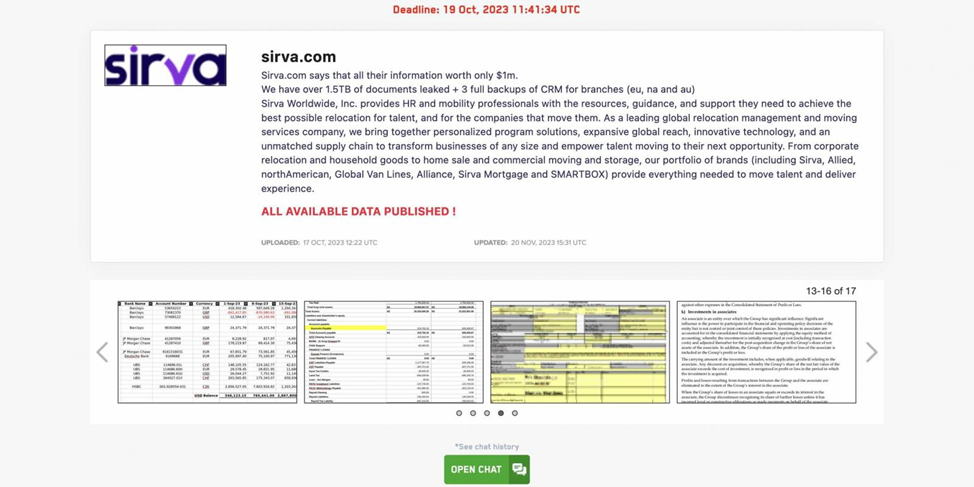Lord777
Professional
- Messages
- 2,577
- Reaction score
- 1,556
- Points
- 113
Even those who quit between 1999 and 2023 may be affected by LockBit's actions.
Two Canadian government contractors, BGRS and SIRVA, which provide transportation services for government employees, were subjected to a large-scale cyber attack last month. As a result of hacking, confidential information of a significant, but as yet unidentified number of employees was stolen.
According to the authorities, the personal and financial data of individuals who used the services of BGRS (Brookfield Global Relocation Services) and SIRVA (Royal Canadian Mounted Police) since 1999 were compromised. This means that the interests of hundreds of thousands of citizens are affected: active police officers, military personnel and officials, as well as those who have long retired or changed jobs.
The ransomware group LockBit claimed responsibility for the attack. On their website, the attackers published part of the stolen data with a total volume of 1.5 TB and threatened further leaks.

It is known that negotiations with representatives of SIRVA were not successful. “Sirva.com claims that their data is only worth $ 1 million. But we have more than 1.5 TB of stolen documents + 3 full CRM backups of branches (European Union, North America and Australia)",- say the extortionists.
The Government of Canada became aware of the hacks on October 19 and immediately deployed all available means of response. External and full-time cybersecurity specialists, law enforcement agencies, as well as various special services units were involved.
Compromised files are carefully examined to determine the extent of damage and the list of specific victims. However, it is already clear that this is the largest leak in the history of Canada for government agencies.
The authorities are developing a support program for potential hacking victims. We are talking about services for tracking credit histories, reissuing passports, and other measures. It is obvious that special control is required in this situation, since the leak threatens not only specific individuals, but also national security in general.
Two Canadian government contractors, BGRS and SIRVA, which provide transportation services for government employees, were subjected to a large-scale cyber attack last month. As a result of hacking, confidential information of a significant, but as yet unidentified number of employees was stolen.
According to the authorities, the personal and financial data of individuals who used the services of BGRS (Brookfield Global Relocation Services) and SIRVA (Royal Canadian Mounted Police) since 1999 were compromised. This means that the interests of hundreds of thousands of citizens are affected: active police officers, military personnel and officials, as well as those who have long retired or changed jobs.
The ransomware group LockBit claimed responsibility for the attack. On their website, the attackers published part of the stolen data with a total volume of 1.5 TB and threatened further leaks.

It is known that negotiations with representatives of SIRVA were not successful. “Sirva.com claims that their data is only worth $ 1 million. But we have more than 1.5 TB of stolen documents + 3 full CRM backups of branches (European Union, North America and Australia)",- say the extortionists.
The Government of Canada became aware of the hacks on October 19 and immediately deployed all available means of response. External and full-time cybersecurity specialists, law enforcement agencies, as well as various special services units were involved.
Compromised files are carefully examined to determine the extent of damage and the list of specific victims. However, it is already clear that this is the largest leak in the history of Canada for government agencies.
The authorities are developing a support program for potential hacking victims. We are talking about services for tracking credit histories, reissuing passports, and other measures. It is obvious that special control is required in this situation, since the leak threatens not only specific individuals, but also national security in general.

